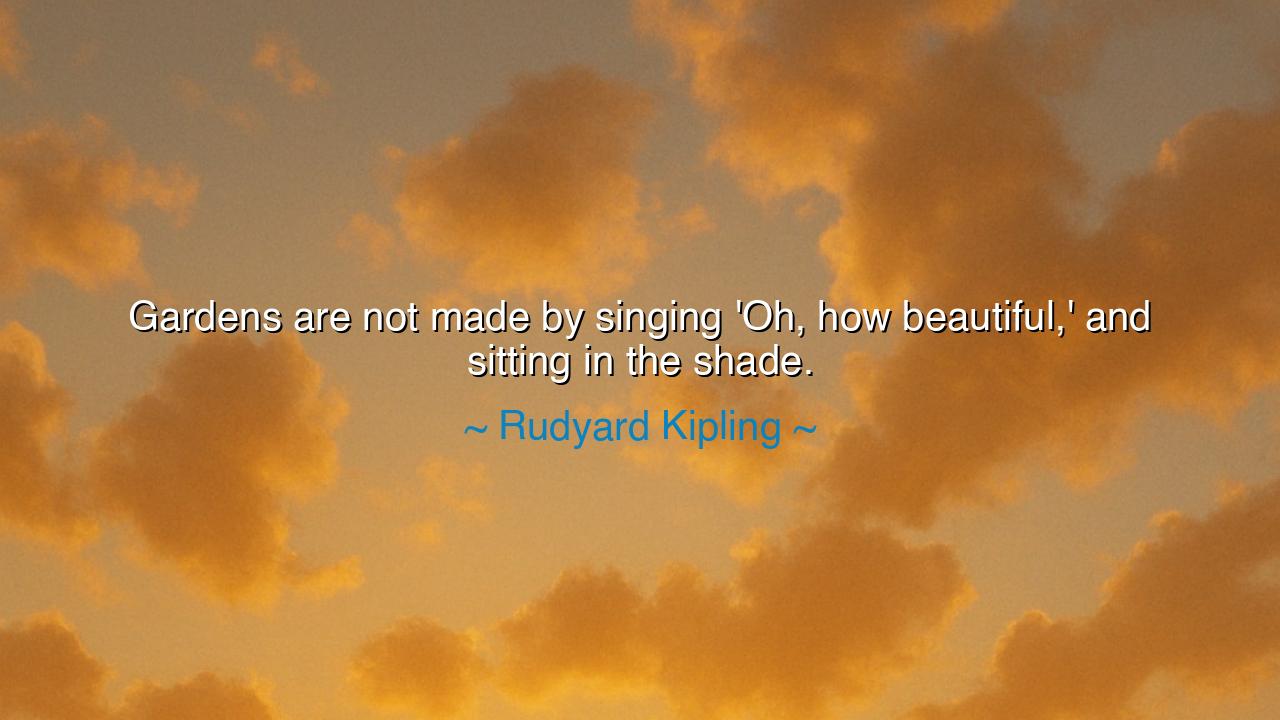
Gardens are not made by singing 'Oh, how beautiful,' and sitting






The English writer Rudyard Kipling, who gave the world The Jungle Book, was not merely a spinner of tales about courage and adventure—he was also a master of life’s subtler wisdom. His quote, “Gardens are not made by singing ‘Oh, how beautiful,’ and sitting in the shade,” captures a truth as old as civilization itself: beauty and fulfillment are born not from admiration, but from labor, discipline, and persistence. The garden, in Kipling’s metaphor, is the world we wish to create—our dreams, our character, our work. And yet, it cannot bloom through idle admiration; it requires the sweat of the brow, the calloused hand, and the steady will that bends the soil toward beauty.
In the age of ancient wisdom, the ancients spoke of toil as the seed of virtue. The farmer who rose before dawn to till his field knew that the earth rewarded not those who praised her, but those who touched her with patient devotion. Kipling’s words remind us that creation without effort is illusion. Whether one seeks to grow a garden, a soul, or a civilization, one must step into the heat, endure the thorns, and labor among the stones. The song of admiration has no power to make roses bloom; only the hand that digs and the heart that endures can make the world blossom.
Consider the story of Masanobu Fukuoka, the Japanese farmer and philosopher who pioneered the “do-nothing” approach to agriculture—not by avoiding labor, but by understanding it. For decades, he cultivated his land not through idle admiration, but through deep observation, balance, and daily care. His fields flourished because he worked in harmony with the rhythms of nature, not above them. Like Kipling’s gardener, Fukuoka knew that true beauty is the reward of devotion. The garden of life answers not to songs of praise, but to the rhythm of persistence.
In a larger sense, Kipling’s garden is also the human spirit itself. Many speak of virtue, of enlightenment, of peace—yet how few rise each day to cultivate them. It is easy to say “how beautiful” when seeing another’s discipline or success. Harder still is to build one’s own. The shade in Kipling’s metaphor is comfort, complacency, and the refuge of dreams untested by reality. It tempts us to believe that admiration is enough, but the world is changed only by those who stand, dig, and dare to plant seeds in the unyielding earth.
There is something deeply heroic in this truth. The gardener, in Kipling’s eyes, is a warrior of peace—a builder who wrestles with time, weather, and his own fatigue. He transforms chaos into harmony. And though he may never be sung of in ballads or crowned with laurels, his quiet devotion shapes the earth for generations to come. The act of tending the garden becomes a sacred ritual: each weed pulled, each seed sown, is a testament to human courage—the courage to act, to persist, and to hope.
History too is a garden made by such hands. When Nelson Mandela emerged from twenty-seven years of imprisonment and began sowing the seeds of reconciliation in South Africa, he was not “singing in the shade.” He was laboring beneath a burning sun of hatred, tilling the soil of a divided nation with forgiveness and vision. His garden was not made by words alone but by the hard, patient work of transforming pain into peace. The beauty of his achievement lies not in its perfection but in the effort that made it grow.
Thus, Kipling’s teaching is both simple and profound: admiration must give birth to action. If you wish to see beauty in the world, you must become its creator. Praise is but the beginning; toil is the completion. Do not merely dream of a garden—build one. Do not merely wish for a better self—forge it in the heat of discipline and time.
The final lesson, then, is this: life’s gardens bloom only for those who labor in love. Let your dreams call you into the sunlight, away from the shade of ease. Work with your hands, your heart, and your will. In the end, when the blossoms come and the air is filled with fragrance, you will know that beauty is not a gift bestowed—it is a reward earned through courage, care, and constancy.






AAdministratorAdministrator
Welcome, honored guests. Please leave a comment, we will respond soon